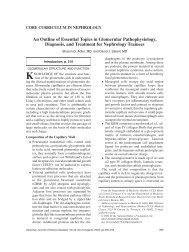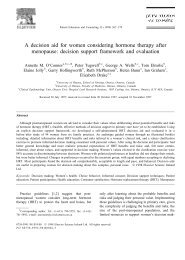Surgery and Healing in the Developing World - Dartmouth-Hitchcock
Surgery and Healing in the Developing World - Dartmouth-Hitchcock
Surgery and Healing in the Developing World - Dartmouth-Hitchcock
You also want an ePaper? Increase the reach of your titles
YUMPU automatically turns print PDFs into web optimized ePapers that Google loves.
Nutrition <strong>and</strong> Development <strong>in</strong> Africa<br />
323<br />
micronutrients, through vertical programs <strong>in</strong> rural areas such as Nyasa Prov<strong>in</strong>ce <strong>in</strong><br />
<strong>the</strong> same country where most of <strong>the</strong>se hypertension consequences are still rare. Promotion<br />
of, for example, iodized salt, is clearly <strong>in</strong>tended as a means of combat<strong>in</strong>g<br />
iod<strong>in</strong>e deficiency, but it may not be seen (perhaps because it is too obvious) that it is<br />
first of all a social market<strong>in</strong>g—of salt. In a population that has been chronically<br />
short of both, we should monitor not only <strong>the</strong> laudable reduction <strong>in</strong> goiter <strong>and</strong><br />
cret<strong>in</strong>ism as <strong>the</strong> benefits we seek, but also <strong>the</strong> changes <strong>in</strong> rates of blood pressure<br />
abnormalities <strong>and</strong> perhaps <strong>the</strong> start of o<strong>the</strong>r evidence of urbanization patterns of<br />
morbidity, reflected from <strong>the</strong> century earlier warn<strong>in</strong>g from Maputo Prov<strong>in</strong>ce <strong>and</strong><br />
<strong>the</strong> onset of possibly preventable epidemics associated with development. Untoward<br />
consequences of medical relief <strong>and</strong> rehabilitation programs should be looked<br />
for <strong>and</strong> honestly reported, even while <strong>the</strong> laudatory objectives are so easily <strong>and</strong> rapidly<br />
reported. 6<br />
No one should be advocat<strong>in</strong>g a retro-dedevelopment, much less celebrat<strong>in</strong>g <strong>the</strong><br />
health advantages of destitution from <strong>the</strong> privations attend<strong>in</strong>g fam<strong>in</strong>e, war, overpopulation<br />
pressures or economic oppression. “Development”, however is usually<br />
assumed quite comprehensively (unfortunately, by many economic advisors,) summed<br />
as <strong>the</strong> iteration of <strong>the</strong> measurable data of consumption. Consumption of <strong>in</strong>creas<strong>in</strong>g<br />
numbers of resources <strong>in</strong> health care might be viewed as a positive marker of development<br />
(particularly by those who receive <strong>the</strong> benefit of <strong>the</strong>se services—<strong>and</strong> lest it be<br />
forgotten, <strong>the</strong>se nearly always <strong>in</strong>clude <strong>the</strong> professional providers), but <strong>the</strong> need for<br />
such services should fit on <strong>the</strong> debit scale <strong>in</strong> such a meta-analysis of nutritional<br />
development, for which focus <strong>the</strong> authors are to be congratulated.<br />
Is it <strong>the</strong> role of healthcare personnel <strong>and</strong> health educators to po<strong>in</strong>t out such<br />
tradeoffs that should be mitigated <strong>in</strong> any development program? Some clearly th<strong>in</strong>k<br />
not 7-9 <strong>and</strong> that such “collateral damage” should be relegated, at best, to o<strong>the</strong>r specialists.<br />
But, it seems, at least <strong>in</strong> Sou<strong>the</strong>rn Africa, that <strong>the</strong> very health care personnel<br />
who should be <strong>the</strong> foot soldiers of this preventive program, who are <strong>the</strong> most embedded<br />
<strong>in</strong> <strong>the</strong> culture, 10 are those most severely afflicted by <strong>the</strong>se “diseases of development.”<br />
A campaign <strong>in</strong> <strong>the</strong> Republic of South Africa to send public health nurses<br />
through <strong>the</strong> schools to warn aga<strong>in</strong>st <strong>the</strong> problems of obesity <strong>and</strong> <strong>in</strong> case f<strong>in</strong>d<strong>in</strong>g for<br />
diabetes <strong>and</strong> hypertension had to be called off, when every s<strong>in</strong>gle one of <strong>the</strong> experienced<br />
public health nurses (thus, employed professionals) who pitched up to be sent<br />
out on <strong>the</strong> campaign was, herself, morbidly obese! 11 Many of <strong>the</strong> surprised health<br />
personnel did not underst<strong>and</strong> why <strong>the</strong> preventive program would be contradicted<br />
by its very emissaries. It was expla<strong>in</strong>ed that obesity, far from a stigma, was part of <strong>the</strong><br />
desiderata of development, like a big house or a motorcar, a mark of achievement, a<br />
presumptively apparent negative serology <strong>in</strong> <strong>the</strong> context of <strong>the</strong> dreaded “Slim,” <strong>and</strong><br />
evidence particularly for a woman, imply<strong>in</strong>g a man who cared for her, or at least a<br />
disposable <strong>in</strong>come, <strong>in</strong>vested <strong>in</strong> her overconsumption <strong>and</strong> underexertion.<br />
Such cultural bl<strong>in</strong>d spots may have been prevalent <strong>in</strong> prior decades of First <strong>World</strong><br />
overachievers, who were really only certifiable as excell<strong>in</strong>g type-A executive class<br />
after <strong>the</strong>ir coronary bypasses. First world hospitals boasted about <strong>the</strong> superior<br />
high-technology care <strong>in</strong>vested <strong>in</strong> such <strong>in</strong>dividual cases of preventable disease. These<br />
may be first <strong>and</strong> emerg<strong>in</strong>g Third <strong>World</strong> res ipsa loquitor cases of health professionals<br />
<strong>in</strong> transition, dazzled by <strong>the</strong> immediate economic <strong>and</strong> technologic numbers, turn<strong>in</strong>g<br />
bl<strong>in</strong>d eyes over <strong>the</strong> downside of development <strong>and</strong> <strong>the</strong> untoward consequences of<br />
“advances” <strong>in</strong> nutritional development <strong>and</strong> health care.<br />
30










